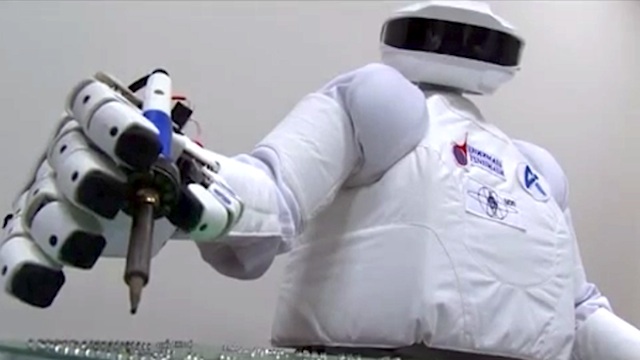
Bot Vid: RoboCosmoNaut
NASA's Robonaut may not be the only advanced robotic astronaut helping the crew of the International Space Station if Russia gets its way: The Russian space agency has developed SAR-400, a cosmonaut version of NASA's robot astronaut, and plan on sending it aloft inside two years. Unlike Robonaut's more automated systems, SAR-400 is more of a tele-operated android "avatar," copying the movements made by a human operator. That means SAR could be sent outside the ship to perform routine maintenance in the risky business of a spacewalk, while the fragile human operator is safely inside.
[youtube 2Ki1ZHJwwNg]
Bot Vid: Roboparking
One scene you may remember from the Will Smith flick I, Robot was an automated car parking system that whisked Smith's concept Audi away automatically to a garage where it was stored on racks--a radically different and more space-efficient model compared to traditional car parking. Now a condo due to be built in Miami starting this summer, will have something eerily similar installed: A robot valet service that shuffles resident's vehicles around on automated platforms. All car owners need to do is park in the in-bay, and the machine does the rest...later they can request their ride via an SMS or a special smartphone app. No ramps, no searching for a free spot, more efficient. The (expensive) future of parking?
[youtube qMWki9Ssdh4]
Bot News
China's In-Car Robo Assistant, An MIT Aida Rival. MIT may be working on a concept in-dash robotic assistant, but Chinese car firm BYD has ideas to actually sell one to consumers. Its hybrid sedan vehicle Qin has a pop-up robot in the dash that appears when you start the car up, taking voice commands, operating the in-car entertainment, helping with navigation, and noticing driver fatigue. The Qin may retail for between $24,000 and $35,000.
Swiss Mind-Controlled Bot. This week a team at the Federal Institute of Technology in Lausanne advanced the science of thought-controlled robots greatly, by having a robot controlled by partially paralyzed patient Marc-Andre Duc over 100 kilometers away--and only requiring that Duc wear a sensor-laden cap. This is a far cry from earlier experiments that needed electrodes actually embedded in the patient's brain. The scientists have also improved the system of control to avoid thought-fatigue, where a wandering mind can lose control of the remote bionic system. The goal is to one day return unconscious limb functionality via prosthetics to paralysis sufferers.
Robo Surgery Simulation Olympics. An event designed to educate the public and promote awareness of robotic surgery took place this week in Pennsylvania. The Robotic Surgery Olympics, kicked off by a robot bearing a flaming torch, saw a full 3-D simulated robot surgeon tool available for the public to try out. Participants had to complete object-manipulation tasks using the 3-D vision system and fine input controls of the surgeon in order to win the games. The event came at the same time research suggests that robot-assisted prostate surgery is at least as good as, if not better than, human-only surgical techniques.
Bot Futures: Will We Blame Robots?
New work from the Human Interaction with Nature and Technical Systems lab at the University of Washington hints at a fascinating sociological phenomenon when robots are part of our everyday life: Even though robots are typically cold lumps of unthinking metal, we sometimes assign moral values to their actions. In a certain manner, this means we're capable of actually blaming the robot for a moral slipup when it does something that has accidental consequences.
The Washington team's experiment was elegant: A volunteer was tasked with interacting with a robot that could accept voice input, and also to play a visually based scavenger hunt game. Only if the robot agreed that the human found all seven objects did the human "win," earning $20. The game was rigged so that every volunteer could easily find the objects, and the robot was actually remotely controlled so it interacted with the humans in a much more dynamic way than would be possible using its own AI. It also refused to identify all seven objects, denying the human's win.
The volunteers were mostly open to interacting socially with the robot, and many of them entered into arguments with what they thought of as a lump of electronics and plastic--attributing blame onto the robot itself. 65% of the volunteers in fact placed some sort of moral value on the bot's actions--and they said they held it less accountable than a human in the same role, but more accountable than a dumb machine. Oddly, about 75%--that is more of the volunteers--felt that the robot could think, could be befriended, and that they could forgive it for a mistake.
It's a highly simplified test case, of course, but it tells us all sorts of interesting things about our increasingly robot-populated future. For example, what happens when even more autonomous, AI-sporting bots are part of our daily life--looking after our kids and our elderly, helping schoolchildren cross the road, performing minor surgery, or patrolling our prisons? If we're so free at awarding moral characteristics to what is nowadays a largely inanimate object that does simple tasks, it becomes important to wonder what we will feel when robots are performing these much more complex feats and using their own automated intelligence to come to decisions. Could you, for example, forgive your robo-butler for letting your dog escape onto the street where it was then injured? Would you blame it on a mere programming error, or would you hold the robot at fault in your mind--to the point you were unable to forgive it, and had to buy a different model?
While emotionally charged, that is a somewhat silly--though not too implausible--scenario. But imagine what we'll have to feel like when a war robot accidentally bombs the wrong target and kills people.
[Image: Russian Space Agency]
Chat about this news with Kit Eaton on Twitter and Fast Company too.